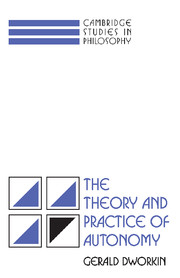1 - The nature of autonomy
Published online by Cambridge University Press: 05 June 2012
Summary
The concept of autonomy has assumed increasing importance in contemporary moral and political philosophy. Philosophers such as John Rawls, Thomas Scanlon, Robert P. Wolff, and Ronald Dworkin have employed the concept to define and illuminate issues such as the characterization of principles of justice, the limits of free speech, and the nature of the liberal state.
In the most recent formulation of the foundations of his theory of justice, Rawls makes clear – what was implicit in his book – that a certain ideal of the person is the cornerstone of his moral edifice. A central feature of that idea is the notion of autonomy.
[T]he main idea of Kantian constructivism … is to establish a connection between the first principles of justice and the conception of moral persons as free and equal. … [T]he requisite connection is provided by a procedure of construction in which rationally autonomous agents subject to reasonable constraints agree to public principles of justice.
Scanlon's defense of a Millian principle of free speech relies also on a view of what powers autonomous persons would grant to the state.
I will defend the Millian principle by showing it to be a consequence of the view that the powers of a state are limited to those that citizens could recognize while still regarding themselves as equal, autonomous, rational agents.
Ronald Dworkin, in his article on Liberalism, does not use the word “autonomy,” but in discussing the idea of treating people as equals he is arguing for equal respect for the autonomy of citizens.
- Type
- Chapter
- Information
- The Theory and Practice of Autonomy , pp. 3 - 20Publisher: Cambridge University PressPrint publication year: 1988
- 8
- Cited by

